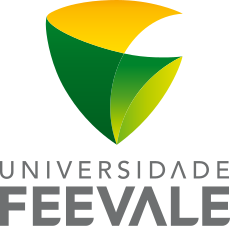
The Federal University of Rio de Janeiro (UFRJ), alternatively known as University of Brazil, is a public research university in Rio de Janeiro, Brazil. It is the largest federal university in the country and is one of the Brazilian centers of excellence in teaching and research.

The Federal University of Rio Grande do Sul is a Brazilian public federal research university based in Porto Alegre, Rio Grande do Sul. UFRGS is among the largest and highest-rated universities in Brazil, having one of the largest number of scientific publications. From 2012 to 2019, the university was elected as the best federal university of Brazil. UFRGS has over 31,000 undergraduate students, over 12,000 graduate students, and more than 2,600 faculty members. As a Brazilian public federal institution, students do not pay tuition fees to enroll in courses offered by the university.

Novo Hamburgo is a municipality in the southernmost Brazilian state of Rio Grande do Sul, located in the metropolitan area of Porto Alegre, the state capital. As of 2020, its population was 247,032. The city covers an area of 217 km2 (84 sq mi), and the average temperature is 19 °C (66 °F), which is mild for the region. The Sinos River runs through the urban area.

The Federal University of Santa Maria is a Brazilian public university located in Santa Maria, in the state of Rio Grande do Sul, funded by the federal government of Brazil. It was founded in 1960, by Professor José Mariano da Rocha Filho. Its campuses span over 1,837.72 ha, with a total of 386,968 m2 of buildings and 28,307 students.

The National University of East Timor, is a public university in East Timor, the only one of its kind in the country.
The Prêmio José Reis de Divulgação Científica is an annual honor awarded by the Brazilian Council of Scientific and Technological Development (CNPq) to the institution, media organization, publication, or individual who most contributed to the dissemination and public awareness of science and technology in Brazil. It is thus named in honor of Dr. José Reis, a Brazilian biologist and science writer who was one of the pioneers in the field.

The Federal University of Rio Grande do Norte is a public Brazilian university funded by the Brazilian federal government, located in the city of Natal, Rio Grande do Norte, Brazil.

The Pontifical Catholic University of Rio Grande do Sul is a private non-profit Catholic university. With campuses in the Brazilian cities of Porto Alegre and Viamão, it is the largest private university of the state of Rio Grande do Sul and the first university founded by the Catholic religious institute of the Marist Brothers. PUCRS is considered the best private university of Brazil's Southern Region by the Ministry of Education (MEC), and one of the best private universities in the country, with FGV, PUC-Rio and the PUC-SP.
The University of São Tomé and Príncipe, USTP, is a public institution of higher education in São Tomé and Príncipe. It is the main institution dedicated to teaching, research and university extension of the country. It was established in 2014 by merging three older institutions of higher education: ISP, EFOPE and ICS.

The University of Cape Verde is the only public university of Cape Verde. The main campus is in Palmarejo, Praia, but there are also institutes in Mindelo, Assomada and São Jorge dos Órgãos. It has over 5000 students. A new campus for Uni-CV is under construction in Palmarejo, financed by the Chinese government. It should be completed by July 2020. It will have capacity for 4,890 students and 476 professors, with a library, dorms, cafeterias and sports facilities. It will have 61 class rooms, five auditoriums with a capacity of 150 seats, eight computer rooms, eight reading rooms and 34 laboratories.

Federal University of ABC is a Brazilian federal public institution of higher learning based in Santo André and São Bernardo do Campo, municipalities belonging to the ABC region, both in the state of São Paulo.

The Amazonas State University is a Brazilian public university operated by the state of Amazonas, located in Manaus, Amazonas, Brazil. It was established in 2001 by a state law that turned the University of Technology of Amazonas into the UEA. In 2011, UEA was ranked the best university of the state in an evaluation made by the Ministry of Education.

The Federal University of Technology – Paraná is a federal university with campuses in thirteen cities located in the state of Paraná.

Insper is a Brazilian non-profit higher education institution located in the Vila Olympia district close to the new business centre of São Paulo, Brazil. The university offers higher education courses on fields of Business Administration, Economics, Computer Engineering, Mechanical Engineering, Mechatronics Engineering, Law and Computer Science.

The University of Taquari Valley is a private research university based in Lajeado, state of Rio Grande do Sul, Brazil. It currently has 13,235 students. As of 2011, it had 404 full-time teaching staff. It offers 45 courses on the undergraduate level, 4 on the master's level and one on the doctorate (PhD) level, also counting with 28 research projects, mainly on the areas of biology, food technology and biotechnology.

Sul-Rio-Grandense Federal Institute of Education, Science and Technology is a Brazilian federal public institution, linked to the Ministry of Education, which composes a Federal Network of Professional, Scientific and Technological Education. It is a multicenter institution, based on the combination of sets of teaching and communication modules in its different forms of teaching, based on the combination of sets of sessions and their respective technological processes.

Universidade Estadual do Maranhão is a public state university in the state of Maranhão, Brazil. It was founded on Dezember 30, 1981, and is based in São Luís. In addition to the Universidade Federal do Maranhão (UFMA), it was the second university in the state. In September 2016, part of it was dismembered for creation of a third, the newly founded Universidade Estadual da Região Tocantina do Maranhão (UEMASUL). With more than 20 thousand students, the institution has 22 campuses and 25 university centers. In the university ranking, it ranks 157th in Brazil. The university rector is Walter Canales Sant' Ana.

The Federal Institute of Education, Science, and Technology of Ceará(IFCE) is a Federal Institute of higher, basic, and professional education, pluricurricular and multicampus, operating in Ceará, Brazil. Specialized in offering professional and technological education in the different teaching modalities, IFCE is based on the conjugation of technical and technological knowledge with pedagogical practice and operates in all regions of the state through its 32 campuses, serving more than 33,000 students in a total installed area of over 5.9 million m2.

The Centro Universitário da Região da Campanha (URCAMP) formerly the Universidade da Região da Campanha, is a multi-campus, community, regional and philanthropic institution located in the southwest region of Rio Grande do Sul. Its headquarters are in Bagé and it has a presence in four other cities in the regions of Fronteira Oeste and Campanha Gaúcha.





















